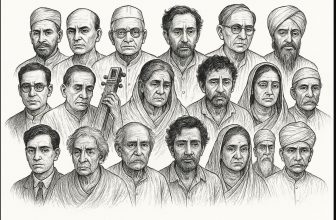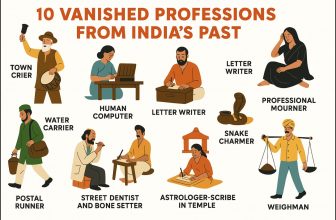India’s freedom struggle was not just led by men but also by extraordinary women who fought courageously for independence. These women played key roles as revolutionaries, leaders, activists, and reformers. From leading armed rebellions to mobilizing mass movements, they defied colonial rule and left a lasting impact on India’s history. Their sacrifices and contributions continue to inspire generations in the ongoing fight for justice and equality.
India’s struggle for independence was significantly shaped by the unwavering courage and leadership of numerous women. Their contributions spanned various roles, from leading armed rebellions to inspiring masses through political activism. Here are nine remarkable women who left an indelible mark on India’s freedom movement:
1. Rani Lakshmibai (1828–1858)
Born as Manikarnika Tambe on November 19, 1828, in Varanasi, Rani Lakshmibai became the Queen of Jhansi and a symbol of resistance against British colonial rule. Trained in martial arts and horseback riding from a young age, she displayed exceptional leadership during the Indian Rebellion of 1857. Her valiant defense of Jhansi and her ultimate sacrifice in battle have made her a legendary figure in Indian history.
2. Sarojini Naidu (1879–1949)
Known as the “Nightingale of India,” Sarojini Naidu was a distinguished poet and a prominent political activist. Born on February 13, 1879, in Hyderabad, she was a child prodigy who later became a key figure in India’s freedom struggle. She was the first Indian woman to preside over the Indian National Congress and played a significant role in the Civil Disobedience and Quit India movements. Post-independence, she served as the Governor of the United Provinces (now Uttar Pradesh), becoming the first woman to hold the position of a state governor in independent India.
3. Aruna Asaf Ali (1909–1996)
A fearless freedom fighter, Aruna Asaf Ali is best remembered for hoisting the Indian National Congress flag during the Quit India Movement in 1942 at the Gowalia Tank Maidan in Bombay. Despite facing arrest and imprisonment, her dedication to the cause never wavered. After independence, she continued to work for social welfare and was awarded the Bharat Ratna, India’s highest civilian award, in 1997.
4. Kamala Nehru (1899–1936)
Wife of Jawaharlal Nehru, Kamala Nehru was an active participant in the Indian freedom movement. She organized women in picketing foreign goods and liquor shops and played a crucial role in mobilizing women for the cause of independence. Her commitment to social issues and nationalistic fervor left a lasting impact on the movement.
5. Kasturba Gandhi (1869–1944)
As the wife of Mahatma Gandhi, Kasturba Gandhi was a steadfast supporter and participant in the struggle for independence. She was actively involved in various movements, including the Non-Cooperation and Civil Disobedience movements, often leading protests and marches in her husband’s absence. Her resilience and dedication made her a revered figure in the freedom struggle.
6. Vijaya Lakshmi Pandit (1900–1990)
Sister of Jawaharlal Nehru, Vijaya Lakshmi Pandit was a prominent diplomat and politician. She was the first Indian woman to hold a cabinet position in pre-independent India and later became the first woman President of the United Nations General Assembly in 1953. Her diplomatic efforts were instrumental in garnering international support for India’s independence.
7. Begum Hazrat Mahal (1820–1879)
A fierce warrior, Begum Hazrat Mahal played a pivotal role during the Indian Rebellion of 1857. As the wife of Nawab Wajid Ali Shah of Awadh, she led a rebellion against the British East India Company, seizing control of Lucknow and reinstating her son as the ruler. Her leadership and bravery made her a formidable opponent to British colonial forces.
8. Annie Besant (1847–1933)
Although of British origin, Annie Besant was a staunch supporter of Indian self-rule. She founded the Home Rule League in 1916, advocating for dominion status for India. Her efforts in education, social reform, and politics significantly contributed to the nationalistic discourse, inspiring many Indians to join the freedom movement.
9. Usha Mehta (1920–2000)
A dedicated Gandhian, Usha Mehta is renowned for organizing the Congress Radio, an underground radio station, during the Quit India Movement. Despite the risks involved, she broadcast messages of resistance and hope, keeping the spirit of the movement alive. Her unwavering commitment exemplified the role of media in the struggle for freedom.
These extraordinary women, among many others, played pivotal roles in India’s journey to independence. Their sacrifices, leadership, and unwavering commitment continue to inspire generations in the ongoing pursuit of justice and equality.
Closing Remarks
This article highlights 9 remarkable women who played an essential role in India’s fight for freedom. It covers their background, contributions, and legacy, showcasing their leadership in movements like the 1857 Revolt, Non-Cooperation Movement, Civil Disobedience, and Quit India Movement. From Rani Lakshmibai’s bravery in battle to Sarojini Naidu’s leadership in politics, these women reshaped India’s struggle for independence. Their efforts were instrumental in securing India’s sovereignty and influencing future generations of women leaders.





